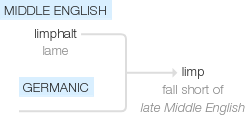Limp
late Middle English (in the sense ‘fall short of’): related to obsolete limphalt ‘lame’, and probably of Germanic origin.
wiktionary
From Middle English limpen(“to fall short”), from Old English limpan, from Proto-Germanic *limpaną(“to hang down”), from Proto-Indo-European *(s)lemb-, *(s)lembʰ-(“to hang loosely, hang limply”). Cognate with Low German lumpen(“to limp”), Middle High German limpfen(“to hobble, limp”), dialectal German lampen(“to hang down loosely”), Icelandic limpa(“limpness, weakness”).
From Middle English *limp, *lemp, from Old English *lemp (recorded only in compound lemphealt(“limping”), from Proto-Germanic *limpaną(“to hang down”), from Proto-Indo-European *(s)lemb-, *(s)lembʰ-(“to hang loosely, hang limply”). Cognate with German lampecht(“flaccid, limp”), Icelandic lempinn, lempiligur(“pliable, gentle”). See above.
From Middle English limpen, from Old English limpan(“to happen, occur, exist, belong to, suit, befit, concern”), from Proto-Germanic *limpaną(“to glide, go, suit”), from Proto-Indo-European *(s)lemb-, *(s)lembʰ-(“to hang loosely, hang limply”). Cognate with Scots limp(“to chance to be, come”), Middle Dutch limpen(“to happen”), Middle Low German gelimpen(“to moderate, treat mildly”), Middle High German limfen(“to suit, become”).
limp
etymonline
limp (v.)
"move with a halting or jerky step," 1560s, of unknown origin, not found in Old or Middle English; perhaps related to Middle English lympen "to fall short" (c. 1400), which probably is from Old English lemphealt "halting, lame, limping," the first element of which is itself obscure.
OED notes that German lampen "to hang limp" (Middle High German limphin) "has been compared." Perhaps it is from a PIE root meaning "slack, loose, to hang down" (source also of Sanskrit lambate "hangs down," Middle High German lampen "to hang down"). Related: Limped; limping. Limpen in Middle English was a different verb, "to happen, befall, fall to the lot of," from Old English limpan, which might ultimately be from the same root.
limp (adj.)
"flaccid, drooping, lacking stiffness or firmness," 1706, of obscure origin, apparently from the first element in Old English lemphealt (see limp (v.)). Related: Limply; limpness. A limp wrist as indicative of male effeminate homosexuality is from 1960.
limp (n.)
1818, from limp (v.).
